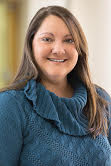By Jennifer Dunn, MSW, LCSW, OSW-C
As we enter the third year of the pandemic and transition from the initial crisis phase to learning to ‘live with Covid,’ we reflect on the ethical implications and challenges posed by the Covid-19 crisis and what they mean for the future of social work. In oncology, it is our role as social workers to walk side-by-side with those coping with great uncertainty. However, in March 2020 we were thrown into great uncertainty ourselves and tasked with assuring ongoing access to cancer care while the rest of the world slowed down. Oncology social workers were deemed ‘essential’ and we donned our masks and personal protective equipment (PPE) (when available) and continued business, but not as usual. We continued to work as resources were rapidly depleted, our colleagues were furloughed or quarantined, social distancing became crucial, all while protecting our own health and coping with the same life-altering dilemmas as the rest of society. We bore witness as conditions worsened for those with whom we typically serve – those in poor health, those living in poverty, as well as those impacted by racism and other forms of oppression and inequity. Patients lost jobs and health insurance, social isolation increased, and community resources disappeared. As a result, Covid-19 posed an exceptional challenge to our professional Code of Ethics; a code designed to guide us in a pre-pandemic world – not one where mandated facial coverings, physical distancing and telehealth are meant to keep us safe, but consequentially create new barriers to effective service.
Social workers around the world identified several ethical challenges that required swift adaptation at the beginning of the Covid-19 crisis. Conducting a full, comprehensive assessment of patients’ needs and safety became nearly impossible. Physical distancing and rapid transition to telehealth services created barriers to developing trusting and empathic relationships and posed challenges to protecting patients’ privacy and confidentiality. For some of us, learning new technology tested our competency. Use of PPE hindered communication and the ability to assess for and pick-up on non-verbal cues and eliminated the use of touch to comfort and console patients and/or family members. When colleagues were furloughed or became ill and quarantined, caseloads expanded, stretching social workers beyond capacity-for those of us in sole positions, there was no social work coverage. As patients’ needs grew and resources were increasingly limited, prioritizing services and ensuring a fair distribution of support became more challenging as social workers had to concentrate on the most urgent situations. Social workers had to weigh patients’ needs and risks against the risk to their own personal health by deciding when it was appropriate to have in-person contact. Social workers reported heightened emotions including fear, anxiety, grief, guilt, shame, etc. Many verbalized feeling stress and exhaustion, as well as lack of value or recognition as essential during this period of crisis. There was also a sense of pride in being a frontline healthcare worker, as well as joy when new practices proved successful.
Despite the ethical conflicts, the advent of Covid-19 taught us about adaptation during crisis and presented us with opportunities to expand and create a more empowered practice. In the aftermath, social workers can utilize their experience to advance the profession in new and innovated ways. Despite its challenges, the increased use of technology in psychosocial care has the ability to connect us with patients in ways we couldn’t before – and when a lack of access exists, it challenges us to be creative in how we stay connected. New and untested interventions lend themselves to research opportunities to investigate their efficacy and advance social work practice. Social workers’ education can expand to include advancements in technology, public health management and policy making to equip future practitioners with skills needed to navigate the next public health crisis. Field placement opportunities must adapt to support greater independence among students, while strengthening supervision to assure the highest standards of practice. Social work leaders can advocate for new social policies to be adapted by their institutions, as well as increased investment in psychosocial services to assure equitable access to care as social workers will be critical in addressing the mental health crisis resulting from the pandemic. Finally, Covid-19 is a reminder of the importance of self-care for those of us deemed essential workers. The National Association of Social Workers identifies self-care as critical to providing effective services. In times of heighted emotions and stress where both your physical and mental health continue to be at-risk, please remember that your needs are equally as important as those in your care.
References
Udah, Hyacinth, and Francis, Abraham (2021) COVID-19: challenges, opportunities, and the future of social work. International Journal of Innovation, Creativity and Change, 15 (1). pp. 54-74. Retrieved from https://researchonline.jcu.edu.au/67457/.
Banks, S., Tian, C., de Jonge, E., Shears, J., Shum, M., Sobocan, A., Strom, K., Truell, R., Uriz, M., & Weinberg, M. (2020). Practicing ethically during COVID-19; Social work challenges and responses. International Social Work, 63 (5). pp. 569-583. Retrieved from
https://journals.sagepub.com/doi/10.1177/0020872820949614

